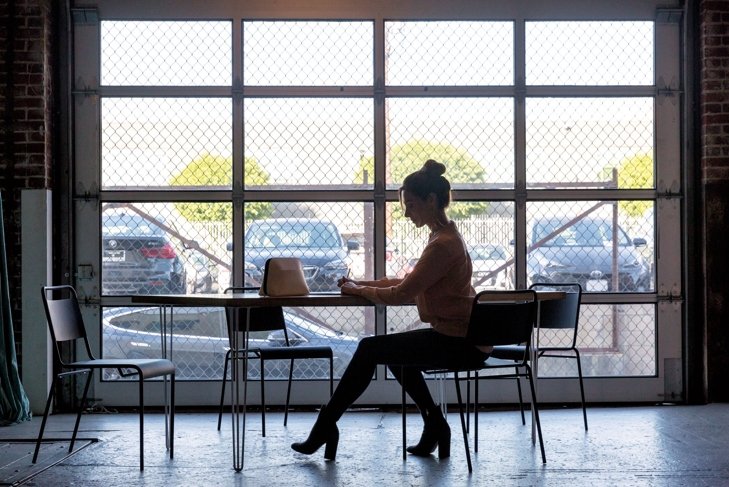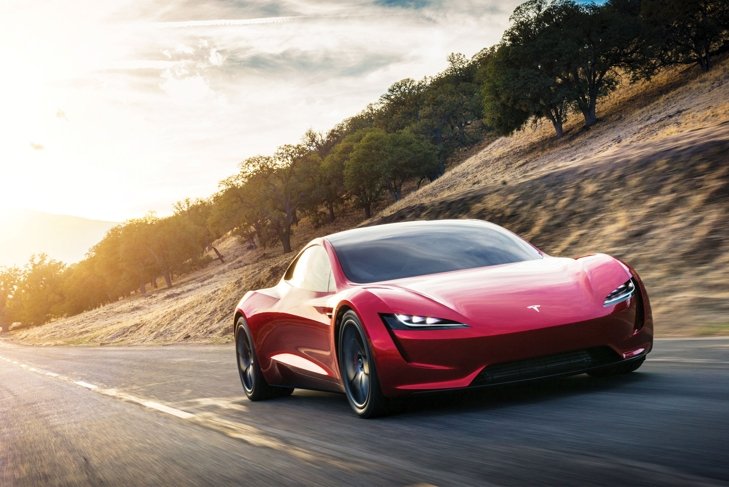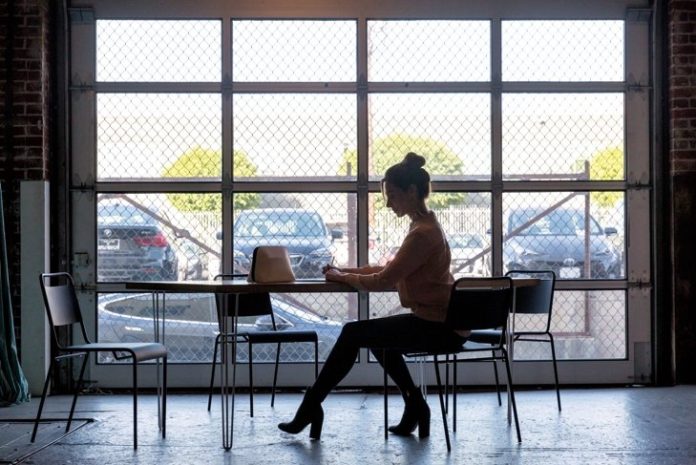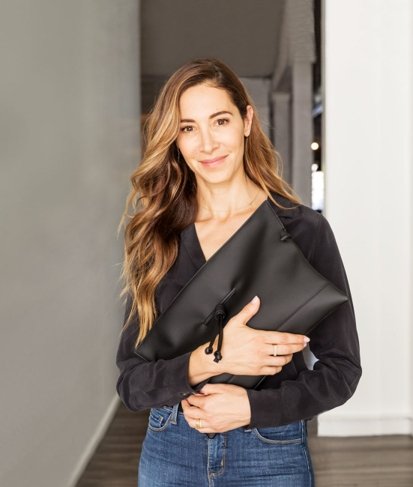
What does it take to succeed as a designer in the competitive world of fashion? For Vicki von Holzhausen, a certain mental cocktail helps. Call it creativity spiked with logic.
“My brain works as a mixture of a problem solver and an artist,” says Malibu-based von Holzhausen, who launched her eponymous brand of sleek, chic purses and accessories in 2015.
Her CV is full of previous jobs at heavy-hitting luxury brand names, which also hasn’t hurt. But if you’re thinking Chanel or Louis Vuitton, you’re heading down the wrong road. Instead, think Mercedes-Benz and Audi.
von Holzhausen got her start in the automotive industry. When she switched from designing cars to designing handbags, it may have looked like a radical departure—but it wasn’t. In fact, by bridging the two industries, she’s made a game-changing discovery: gorgeous leather goods don’t have to be leather at all. They can be made of something smarter.
A winding road
von Holzhausen realized at just 13 years old through taking classes at Pasadena’s ArtCenter College of Design that industrial design perfectly suited her.
“I loved to draw and realized you could actually make a living doing it. I gravitated toward car design because it felt like the most creative career, like how we’re supposed to live in the future with these beautiful shapes—it was really inspiring,” she recalls.
Once she graduated from ArtCenter’s automotive design school at age 22, von Holzhausen took an internship with Audi in Europe. She promptly “fell in love with design, fashion and the European sensibility—the form and function side of things and the aspirational lifestyle.”
Fourteen years working—and winning awards—in design and manufacturing for Audi, Mercedes-Benz and General Motors followed. Then, the creative beauty took a break to have her two boys, now ages three and four, with husband Franz von Holzhausen, chief designer for Tesla. By that point, one-half of the design power couple was ready for a challenge beyond taking a car concept from sketch to road.
“I had done what I set out to do and wanted to try something different,” she recalls.
Soon, she identified a compelling opportunity.

How Vicki prioritizes health
- Balance: “I try to clear my mind every day and not let work overload me. My family helps me keep perspective. Playing and spending time with my kids is actually a huge stress reliever.”
- Exercise: “I like to do a circuit class a couple times a week with weights, Tabata or plyometric training, and aerobics at F45 Training Pacific Palisades. And I love [the] Sworkit—it’s great to wake up and do a 20-minute core Sworkit outside at my house.”
- Timing: “I carve out time to work out really early in the morning (6:30 a.m.), which makes me feel like I’m already ahead and energized by the time I hit my desk at 8 a.m.”
- Mindset: “I feel like competition is not a positive thing in exercise. I try to improve myself as time goes by, but it’s not a competition.”
- Diet: “I pretty much eat like a vegetarian or a vegan, and I love discovering new ways to improve my diet and enforce that with my kids, to inspire them to eat easy, fresh, natural things, not complicated foods.”
Changing lanes
“I thought I could make a difference in the fashion space by bringing both my minimal aesthetic I really love and also the technology aspect of what I had learned throughout all those years in the auto industry,” says von Holzhausen.
The designer was prepared in many ways to tackle the challenge of building a brand from the ground up: “Fashion and cars are really similar,” she says, “especially in the inspiration aspect, because they’re very romantic and people look to the imagery and lifestyle as aspirational. That translated.”
Still, she discovered challenges around juggling so many moving parts. “It took me a second to get my head around all of it—marketing, product, pricing, collaborations, how to sell it, what are you doing to get the word out, public relations. It took a second to turn my design brain off and look at all the other aspects of the business and goals,” she says.
Perseverance was a major lesson. She also prioritized transparency, which is evident in the direct-to-consumer pricing of just two to two-and-a-half times the production cost (what would typically be wholesale). Additionally, she donates 10 percent of proceeds each month from all von Holzhausen bags and a newly expanded range of accessories and small goods to women-centered charities.
She hopes the brand will become Americans’ go-to for sustainably minded accessories, and it has already caught on quickly. She started solo; today, she’s got employees to oversee and craftsmen to guide (all her products are made in the USA). But the growth—and the changes—aren’t over.
A new way forward
von Holzhausen wasn’t satisfied simply making leather bags, even though she’d sourced leather that was solely a byproduct of the food industry and had it tanned in a nontoxic manner. “One of the pillars of my brand is to find materials with more attributes than basic function and form—what I call ‘intelligent materials,’ designed using the least amount of natural resources,” she says.
She also wanted to create a holistic vision of ethical style, meaning all components of the business aspire to be ethical—eventually, she hopes, good for people, animals and the environment.
“I almost feel that you don’t have a choice,” she says, referring to the state of our planet.
So she went back to her roots, the auto industry, where she discovered a durable, scientifically advanced technical alternative to leather.
“When I was working in car design, I used fashion as inspiration; now that I work in fashion, I use cars as inspiration,” she says.
Of course, she put her own spin on the leather alternative, resulting in a performance material called Technik-Leather “that has a beautiful, exquisite feel and all these attributes that are better than leather.” She launched her Technik-Leather collection in February last year.
The new material is vegan. It’s lighter than leather. It’s also stain-, water- and scratch-resistant, which “gives you the freedom to live your life,” says von Holzhausen. “So you can look really chic and cool and not worry when your bag gets dirty.”
The greatest proof of her faith in the non-leather leather? She’s aiming to switch completely to Technik-Leather in the first quarter of 2018.
Keeping the tank full
It’s impossible to get a glimpse into von Holzhausen’s busy boss lady life without a classic question springing to mind: how does she do it all?
The designer makes an effort to delegate basic tasks so she can reserve her energy for strategy and creative work. “Every day a portion of my work is creative,” she says. “You can apply creativity to all aspects of the business, and it’s super important that you do. I don’t consider drawing the only creative part.”
She’s a pro at maintaining balance in her life through mindful practices—“Understand your priorities, make time for things that really matter and don’t overschedule”—and minimalism. von Holzhausen admits having fewer, better quality things “really helps my well-being.”
Her family interactions also play an immense role. She takes time daily to play with her boys, and she says she and Franz don’t talk business when they’re together. One might think a pair of car designers would talk shop, but actually, she says, “We talk about things that are more fun. We love to discover local art galleries. We’re redesigning our house together, so we’ve been finding cool art in LA to put in it.”
In fact, says von Holzhausen, “When I have free time, I don’t think about work so much. Living a life of wellness is leaving your work at work and focusing on what you’re doing in the moment.”

How the other half designs
Vicki’s husband, Franz von Holzhausen, has an eye for function and aesthetic beauty in his own right. Franz was handpicked nearly a decade ago by Elon Musk to head up Tesla’s design team. Since then, they’ve created the industry-altering Model S, X and 3.
Franz’s latest creation? The incredibly high-performing Tesla Roadster supercar. With a 0 to 60 mph acceleration time of 1.9 seconds, it will be the quickest street car ever produced. Top speed is north of 250 mph, and range on a single charge is an unprecedented 620 miles. The $200,000 car represents a giant leap in automotive technological advancement, electric or otherwise, all wrapped in a strikingly beautiful, wind-cheating shell. Also interesting to note: Tesla no longer uses leather for any of its vehicle seats. Amazing.
-Brendan Brazier
PHOTO BY Jaime Kowal




